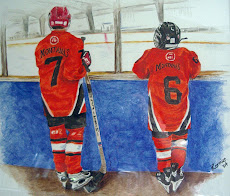Recently, Kodak filed for bankruptcy. I felt a tinge of sadness at the news. I had studied photography in college, and spent many years selling Kodak film while working at Henry's and Black's. Paul Simon's popular song was my mantra. I even sold stale-dated Super 8 Ektachrome to Sting and Andy Summers when they dropped by the store way back in the Eighties before they were famous. I have boxes and boxes of slides and photographs recording every moment I thought was beautiful and wanted to share with everyone.
While at college, I not only honed my painting skills, but also learned how to develop film and print my own photographs in a darkroom. At first, the process seemed complicated and very mysterious. First I had to expose the film or photographic paper to controlled light, either through a camera or enlarger lens. Then I immersed the film in a developing solution for a set time, then switch to an acid bath to stop the process. By the end, I had a photograph to put in a frame or an album.
A hundred (or thereabouts) years ago, photographs were exposed on sheets of metal coated with silver. A photograph was expensive and a really big deal. It was the next big thing after portrait painting. Kodak introduced the Brownie camera, making it even easier for average Joes to record their moments and keep them forever, or at least as long as the paper lasted before fading.
Kodak first came up with digital cameras, and yet they are failing to adapt to the changing landscape. Instead of developing new equipment to capture "Kodak Moments" they stuck with printers and paper. They concentrated on the end result but didn't think about how the medium was first created: through the mind's eye.
Publishing is going through a similar change. Our mind's eye creates a story, but the way we bring that medium to the masses is changing. Remember typewriters? Pens and paper? A pack of monks illuminating Mediaeval manuscripts? We brought our art to fruition through a painstaking process.
Now, it's so easy. Yay for computers! Well... easy to get it down in physical form. The writing part is still hard. But today, publishers are struggling with getting the final product to the masses. E-books are becoming more and more popular and paper costs are rising. Publishers are still hanging onto the concept that physical books are the only way to go, and are struggling to stay alive.
 I love physical books. I like signing them for my readers. I like to look at them on my shelves and feel the paper with my fingers. I love wandering in book stores. I love old books with their musty smell and yellowing pages.
I love physical books. I like signing them for my readers. I like to look at them on my shelves and feel the paper with my fingers. I love wandering in book stores. I love old books with their musty smell and yellowing pages.But like it or not, digital publishing is here to stay. I understand that it is a more efficient way to allow readers to immerse themselves in the stories we writers want to share. I hope both mediums can find a way to share the space in our brains.










